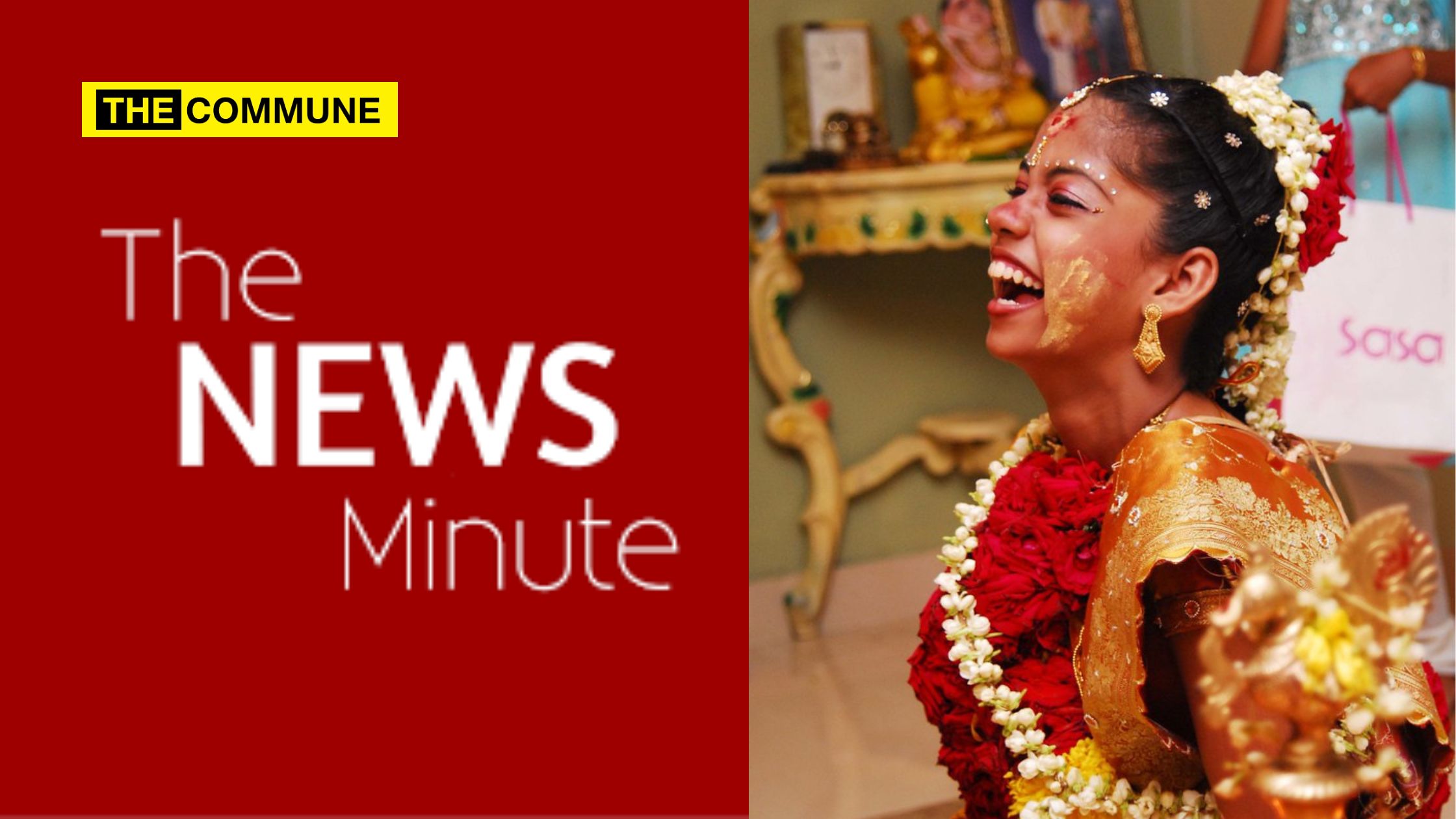
A recent article by The News Minute has sparked a conversation about the celebration of menarche in Tamil society. The article that suggests that such puberty ceremonies can be ‘traumatic’ for young Tamil girls. There are so many points the author of the article failed to take note of despite being a “journalist”.
First of all, this ceremony or celebration of menarche is not limited to Tamil society. All Hindus celebrate the onset of periods in different ways, ranging from grand celebrations to simple family functions.
The New Minute loves controversy and this time it has used this topic to stir one. The journalist claims that puberty ceremonies are traumatic for young girls and apparently many women shared similar experiences. The publication’s history of criticising Hindu rituals and culture has led to people questioning their intent on Hinduism. While there are scientific reasons behind the practice, such as isolation and dietary changes, it is worth noting that celebrations of menarche are not exclusive to Tamil culture. Other countries and cultures also honour this milestone, albeit in varying ways. Let’s have a look at a few:
Brazil
In the Amazonian Tikuna tribe of Brazil, girls who have their first period spend between three months to a year living in private rooms in their family homes. This is known as the “pelazon” and serves as a rite of passage into womanhood. During this time, girls learn about their tribe’s history, music, and beliefs before being welcomed back into the community with a celebration.
Japan
When a girl in certain regions of Japan experiences her first menstrual period, her family marks the occasion by partaking in a traditional dish known as sekihan. This dish is made with sticky rice and adzuki beans, with its red color symbolizing happiness and joy for the celebratory event.
Native Americans
The Native American tribes in North America honor girls who reach puberty through a ceremonial event called The Sunrise Ceremony. This celebration involves various rituals and gift-giving, with the girls donning symbolic attire and enjoying a feast. In Native American culture, the transition from childhood to adulthood holds great significance, and they hold various rites of passage to affirm their community values and traditions.
The Navajo people still practice their puberty ritual for girls, called kinaalda. The ceremony takes place over four days and includes running towards the rising sun and learning tribal wisdom. The girl is expected to take on new levels of responsibility for herself and others. The emphasis of the ritual is on physical strength and character. Throughout these traditions, the celebration of a girl’s transition into womanhood is recognized as an important and meaningful event in her life.
Canada
The Nootka people of Canada have a party for girls after their first period. After the party, the girl undergoes an endurance ritual where she is left to swim back to land. Upon arrival, she is recognized as a woman who has demonstrated patience and perseverance.
West Africa
Among the Dagara people of West Africa, initiation ceremonies are held once a year for girls who have started menstruating in the past year. The ceremony includes mentoring on topics such as sex, intimacy, and the healing powers of menstruation.
It seems that the journalist in question may not have done her due diligence before writing her article. In fact, a simple Google search will show that puberty parties and ceremonies are celebrated across the globe in a variety of ways and The News Minute journo overlooked the cultural significance of these ceremonies.
The Hindu archives show how Puberty Parties are a thing among the rich and famous. This article says that in the US, Sweet Sixteen parties are a beloved tradition in the U.S., serving as a way to mark a significant milestone in a teen’s life. No, it is not of Indian origin, but this coming-of-age event is still celebrated with great enthusiasm. Sweet Sixteens are thought to have been inspired by the Mexican quinceañera, which celebrates a girl’s 15th birthday.
The West’s rites of passage are pretty lacklustre. Getting a driver’s license, being able to vote, or drinking legally just don’t have the same significance as marking puberty, and they don’t involve the support of your whole community. Even though the children might be excited for them, these events don’t really honour the power that comes with the physical and emotional changes of puberty. Without meaningful coming-of-age ceremonies or opportunities to prove themselves, a lot of teenagers turn to drugs, alcohol, or other risky behaviours.
In the West nowadays, daughters ask their parents for a period party because everyone else is having one. Some parents go to great lengths to do this for their daughters. This tweet was shared by a mom a few years back on Twitter. So is this type of celebration okay for the journalist?
Brooke started her period today & my family is super extra 😂😩 pic.twitter.com/ed14gNrgKf
— Autumn Shea (@autumn1shea) January 10, 2017
The concept of period parties has been making waves across the internet for quite some time, with various accounts of young girls celebrating their first period with themed cakes and decorations.
The cakes and cookies, often red or blood-themed – isn’t this insensitive and demeaning to the girl’s experience. Isn’t the use of explicit language such as “you’re on your period” on the cake insensitive and trivializing a natural biological process?
‘Feminists’ speak of respecting women and celebrating women, so why not celebrate womanhood? Isn’t menarche an indication of the onset of womanhood? So, shouldn’t it be celebrated? But some ‘feminists’ seem to think otherwise. She wrote about how traumatic puberty ceremonies are for Tamil girls, and how they’re paraded as ‘ready for marriage’. But really, is that what these celebrations are all about? She also writes about women having to hide their period pads – would they prefer to wear their pads on their foreheads instead?
Puberty & Islam
A little search about puberty and Islam led me to this video where Assim al Hakeem, an Islamic scholar, explains that celebrating a girl’s reaching puberty with rituals and feasting is not from the Sunnah (teachings of Prophet Muhammad) and is an innovation that has been adopted from Hindu culture in India and Pakistan (read adopted from Kaffirs).
He says Muslims should prioritize their religion over culture and customs and not blindly follow the practices of non-Muslims. He also goes on to say it is the work of Shaitaan and warns against extreme behaviour in both celebrating and concealing menstruation and emphasizes the importance of submission to Allah’s teachings. Celebrating in such a way is considered haram and punishable by Allah. Oh well, now we can understand why journos don’t like such celebrations.
It is interesting how we’ve become a society that loves to celebrate every little thing – from the first birthday of a child to the proposal anniversary, engagement anniversary, wedding anniversary, and the list goes on. We don’t hesitate to spend a lot of money on these celebrations either. But when it comes to celebrating a girl’s transition into womanhood, suddenly it becomes cringe-worthy and traumatic, according to some people. It’s almost like we have our priorities messed up. Why is it that we can celebrate weddings, photo shoots, and honeymoons, but not something as natural and significant as menarche?
In summary, menarche happens only once in a girl’s life. So, it’s a big deal and it’s something that should be celebrated according to cultural and traditional rituals. Some feminists and journalists from TNM might find it “traumatic” but when you make the girl understand the significance and beauty of it, their argument doesn’t really hold up. Sure, putting up banners and stuff might be a bit cringe, especially in Tamil Nadu where it’s a big thing, but overall, it’s a good thing to celebrate menstruation.
Feminists talk about how we should be more open about talking about periods and sexual health, but they don’t seem to like ceremonies like this which exactly do that. In a world where we celebrate everything from our pets’ birthdays to gender-reveal parties, acknowledging something as important and empowering as menstruation seems only like a positive thing. So, why not celebrate it?
Feminists ask for periods and sexual health to not be taboo but they find this ceremony which does exactly that to be regressive. In a world where we mark everything from gender-reveal parties to our pets’ birthdays, recognizing something as significant and empowering as menstruation is truly a positive thing. So why not?
Click here to subscribe to The Commune on Telegram and get the best stories of the day delivered to you personally.




